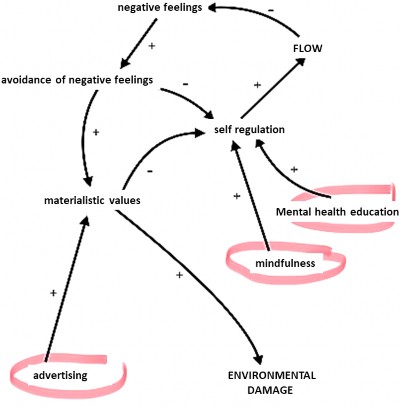Flow, and materialistic values
Elinor Hurst
A recent paper by Isham and Jackson (2022) [1] of the Centre for the Understanding of Sustainable Prosperity (CUSP) discussed the effect of the psychological state known as flow on materialistic values. Flow is a pleasant state of experience when an individual is completely immersed in an activity.
It occurs when the balance of skill and challenge for an activity is at an optimum for the individual. Materialistic values are associated with less sustainable lifestyles and less concern for environmental health, so are undesirable for achieving ecological sustainability.
The authors found by research and experiment that materialistic values tended to undermine a person’s ability to achieve a state of flow. They posited that this was due to an association between materialistic values and lower levels of self-regulatory ability. Self regulation is the process by which individuals manage their thoughts, emotions and behaviours in line with certain goals, norms or expectations. For example, choosing to eat healthy foods when trying to lose weight, overcoming resistance to exercise, or making the time to practise skills in order to become expert.
To achieve flow requires self-regulatory ability, as it requires achieving a certain level of skill in a task in order for it to become challenging and engaging. But materialism tends to undermine self regulation, as it encourages the relief of negative feelings through acquisition or short term consumption. Undermining the ability to self regulate then leads to less experience of flow in materialistic individuals, which, ironically, tends to lead to more negative feelings. Regular experience of flow has been shown to produce higher life satisfaction.
The dynamics of these interrelated factors is shown in Figure 1.
Flow is not always associated with less environmentally damaging pursuits, but there are many candidates for such activities. The authors identify five categories of these: (1) positive, romantic relationships; (2) contemplative activities; (3) creative activities; (4) sport and physical exercise; and (5) social engagement.
How can such sustainable flow activities be encouraged? Several possible areas for intervention are suggested. One is to reduce the emphasis on materialistic values in society, specifically by reducing the amount of advertising to which people are exposed. Greater exposure to advertising has been linked to the adoption of stronger materialistic values.
Another is to promote time in nature and nature-related pursuits.
Self regulatory strength can also be encouraged by promoting the practice of mindfulness, which has been shown to boost this capability, and reduce materialistic values.
Discouraging what is sometimes described as “toxic positivity” or the avoidance of negative feelings by false optimism is also something that would be socially beneficial. Self regulation is strengthened by acceptance of negative feelings and learning how to manage them, rather than avoiding them. Mental health education in schools could be very helpful in this regard.
The authors conclude by saying that further research in this field is needed, for example on optimal amounts of flow time needed for wellbeing, and the implications for further encouragement of suitable flow activities to promote more pro-ecological values.
1. Amy Isham and Tim Jackson (2022), Finding flow: exploring the potential for sustainable fulfilment, Lancet Planet Health 2022, 6: e66-74.
Dr Isham and Prof Jackson are associated with the Centre for the Understanding of Sustainable Prosperity (CUSP), University of Surrey, Guildford, UK































